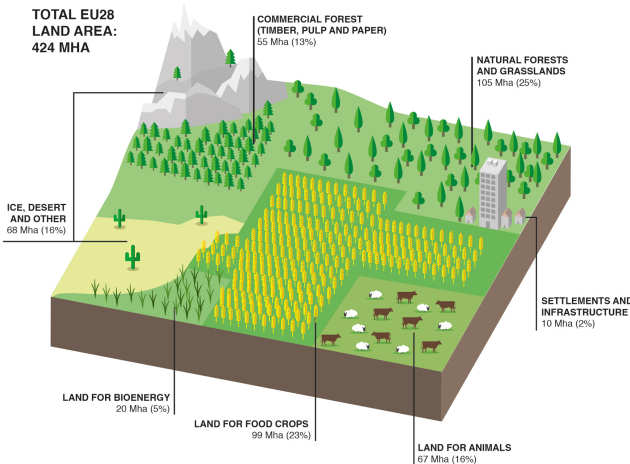Topics: Mitigation
Type: Briefing paper
Publication date: March 2016
Download
Summary
 Authors: Alexandre Strapasson, Jeremy Woods and Kofi Mbuk, in partnership with the UK Department of Energy and Climate Change (DECC) and the Foreign and Commonwealth Office (FCO).
Authors: Alexandre Strapasson, Jeremy Woods and Kofi Mbuk, in partnership with the UK Department of Energy and Climate Change (DECC) and the Foreign and Commonwealth Office (FCO).
Headlines
- Land use change, such as afforestation, reforestation and multiuse of land resources, has the potential to contribute substantially to reducing Europe’s greenhouse gas emissions.
- Changes in the types and quantities of food consumed per person and reduced food wastes would help the EU meet its climate change targets by 2050.
- EU greenhouse gas emissions are highly sensitive to the food trade balance, both within and outside the EU. Choices made about the EU’s level of selfsufficiency in food and food security are key determinants of net EU and global greenhouse gas emissions.
- To assess complex land use dynamics, including multiple uses of varying intensities, combinations of empirical data, mapping tools and integrated systems models are needed.
- To achieve greenhouse gas emissions reduction through land use and dietary change, the right mix of short and long-term policies is needed. In the case of dietary changes and reduced food waste, success may depend on systemic behavioural changes which would require a range of policy levers ranging from market regulations through to education and links with the health agenda.
Introduction
Food consumption patterns and production methods have major implications for land use and greenhouse gas (GHG) emissions. Climate change mitigation policies are usually focused on energy, transport, buildings, infrastructure and industry. However, changes in our diet and associated land use for food production could substantially affect GHG emissions.
This paper describes the relationships between land resources, land use futures and the related greenhouse gas emissions and mitigation strategies, in order to inform the climate change debate and encourage reflection on sustainable land use strategies in Europe. A range of variables such as diet, agricultural and forest productivity levels, demographics and societal demands, and the effectiveness of waste minimisation and re-use strategies drive the land use dynamics that we observe and project. These variables are interconnected and subject to complex dynamics and interactions.
Download now: Land use futures in Europe - Grantham Briefing paper 17
View publications by:
Topic
Climate Science
Earth and Life Sciences
Energy and Low-Carbon Futures
Resources and Pollution
Economics and Finance
Health
View all publications and browse by year
Publication type
Briefing papers and Briefing notes
Grantham Institute Outlooks
Evidence & submission papers
Infographics
Institute reports and analytics notes
Grantham notes
Collaborative publications
Discussion papers
Institute event overviews
Working papers